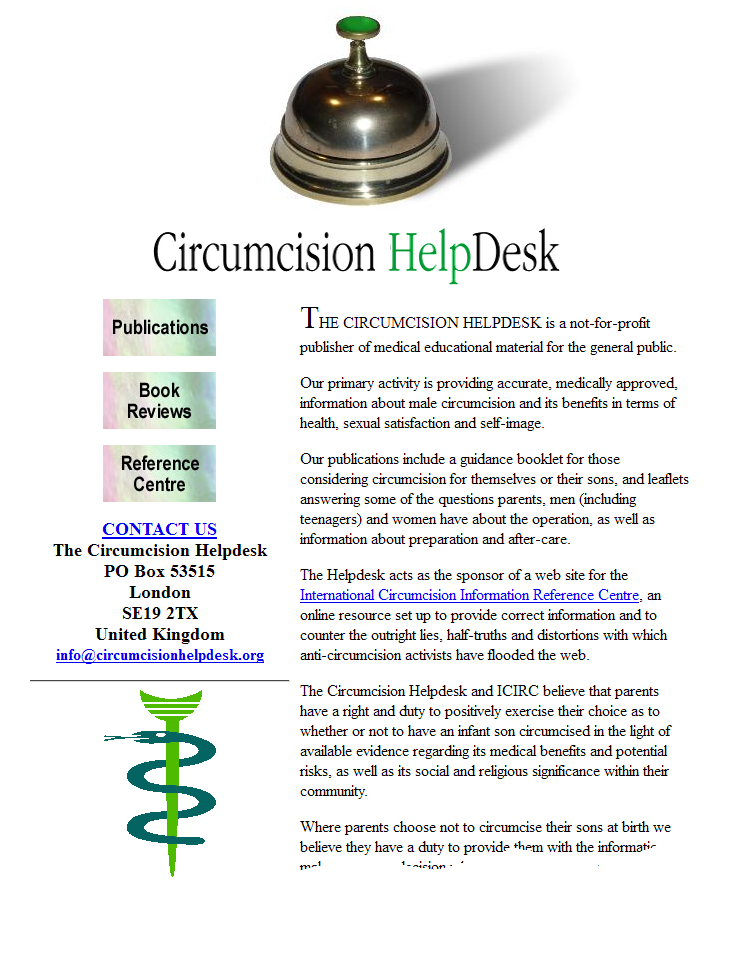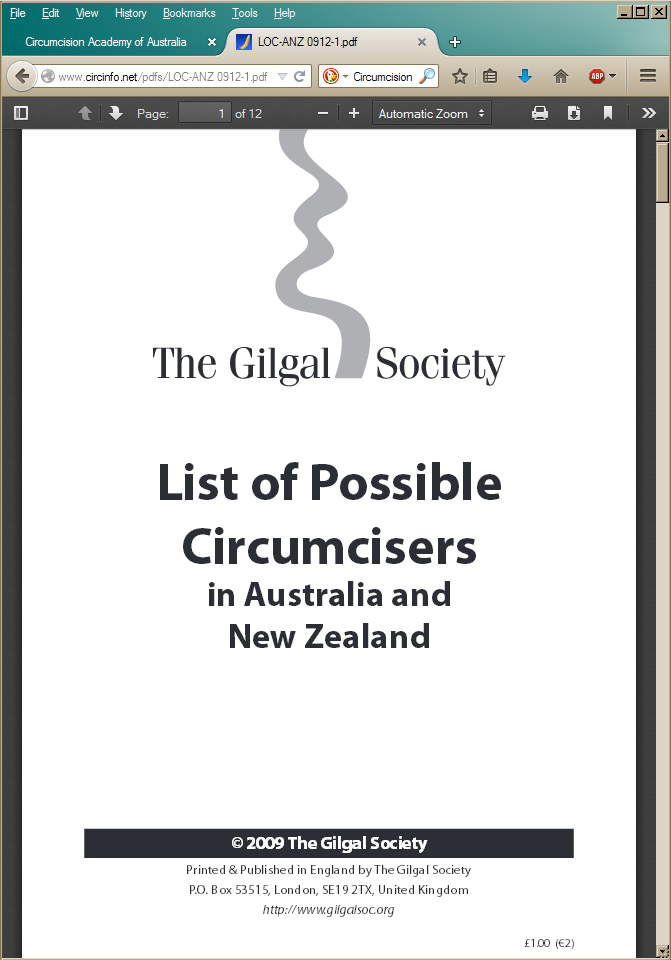|
Jewish Daily Forward
July 8, 2014
Anti-Semitism Envoy Wades Into Europe Circumcision Wars
Ira Forman Uses Bully Pulpit To Defend Rite
by Ron Kampeas
Washington - The Obama administration's anti-Semitism monitor
has added an issue to his office's portfolio: defending circumcision in
Europe.
Circumcision has become a top focus for Ira Forman, the State
Department's special envoy to monitor and combat anti-Semitism. He has
been using the pulpit his office provides to warn European governments
that moves to ban ritual circumcision could lead to the demise of their
countries' Jewish communities.
[There are no moves to ban it, only defer it.]
"Because circumcision is essentially universal among Jews, this can
shut down a community, especially a small vulnerable community," Forman
said.
[That does not follow.]
No European country has outright banned the practice, but there is
increasing pressure to do so, and some countries have imposed
restrictions such as requiring medical supervision. Forman is the State
Department's third anti-Semitism monitor. While he has maintained his
predecessors' focus on anti-Semitic acts and rhetoric worldwide, he
said that protecting circumcision has become urgent because calls for
bans are gaining legitimacy, particularly in Northern Europe.
In the past six months, Forman has raised the issue in meetings with
ambassadors to Washington from Denmark, Germany, the Netherlands,
Norway, Sweden and Switzerland. He says he plans to raise it with
envoys from other Northern European countries, where pressures to ban
circumcision are most acute.
He also has asked the relevant desks at the State Department to have
U.S. diplomats raise the issue in their meetings in their host
countries.
Forman, who is Jewish, contrasted efforts to prohibit circumcision
with bans on ritual animal slaughter - in place in some countries for
decades - which at least have workarounds, for instance by importing
frozen kosher meat.
"Circumcision, if you ban it, you have three choices: You do it
underground illegally, you take a little 8-day-old baby across state
lines - and if you have contiguous states [with bans], doing that
becomes harder and harder - or three, you emigrate," he said.
[He left off "four, you stop doing it."]
A comprehensive 2012 survey of European Jews by the European Union
Agency for Fundamental Rights found substantial majorities of Jews
classifying a hypothetical ban on circumcision as a "big problem."
"I will wait for the developments concerning a statutory regulation
on the Brit Mila," the survey quoted a German respondent as saying,
using the Hebrew phrase for ritual circumcision. "This will be crucial
for my decision on whether or not to leave Germany."
Leaders of Jewish communities in countries that are contending with
public pressure to ban the practice similarly warn that such a move
could spur an exodus of Jews. "I have said that a country which saved
the Jews during the Second World War, if they would establish any law
against circumcision, they would have done what Hitler wanted to do,"
said Rabbi Bent Lexner, chief rabbi to Denmark's Jewish community of
7,500.
European officials say their countries have instituted protections for circumcision in response to public pressures.
"A ban on circumcision is not in question for the Norwegian
government," Frode Overland Andersen, a spokesman for his country's
Foreign Ministry, told JTA. German and Danish officials have issued
similar assurances.
Jewish communal officials appreciate the assurances that
circumcision will not be banned. Nonetheless, Jewish communal officials
warn that the danger of circumcision bans in Europe has not
substantially diminished.
"The trend is really moving against us in one considerable way, and
that's in terms of general European public opinion in Northern and
Western Europe, particularly Scandinavia," said Rabbi Andrew Baker, the
American Jewish Committee's director of international Jewish affairs.
Calls to ban circumcision gained momentum after the Parliamentary
Assembly of the Council of Europe passed a resolution last October that
called for a public debate on the "rights of children to protection
against violations of their physical integrity." It lumped male
circumcision with female genital mutilation and corporal punishment.
The assembly, however, lacks power. In April, the council's
leadership advised members that male circumcision was "by no means
comparable" to female genital mutilation and recommended against
further attempts to target the practice.
Nonetheless, children's ombudsmen in a number of Northern European
countries have called in recent years for restrictions on the practice,
as have medical professionals' groups. Jewish leaders say that as
Northern Europe becomes increasingly secularized, its populace tends to
place more value on freedom from religious coercion than on freedom to
practice religion.
"These are post-religious and post-ritual countries," said Rabbi
Michael Melchior, the Israel-based chief rabbi to Norway's 800 Jews.
"And the vast majority of the population don't have a clue what ritual
is. They see ritual in general as something which belongs to some dark
evil - they have medieval conceptions [of rituals] which have nothing
to do with modern society."
In one way, some Scandinavian governments have nodded toward
circumcision opponents by including in their laws requirements that
circumcision take place under medical supervision. Norway's parliament
passed such a law last month. Norwegian Jewish leaders applauded the
measure because it allowed the rite to be carried out under a
physician's supervision.
In Sweden, said Lena Posner-Korosi, president of the country's
20,000-strong Jewish community, circumcision is permitted until two
months, which effectively shuts out the Muslim community, in which boys
are often circumcised as toddlers.
Anti-Muslim sentiment in Europe helps drive the anti-circumcision
clamor, Jewish communal leaders say. If anything, sensitivities in
Northern Europe about the 20th-century record on Jews are what has led
governments to protect circumcision.
"One of the important parliamentarians told me it is convenient for
us to put the Jews at the front of this issue," Melchior said. "Because
in the public in Norway still, it is much more difficult to go out
against the Jews than the Muslims."
Jewish officials said that anti-Semitism, while a concern in other areas, is not a factor in the debate,
although Jewish stereotypes have emerged in its wake. When
pro-circumcision activists in Germany cited American studies showing
that the practice was practically harmless and had possible medical benefits, opponents suggested that American Jewish doctors had skewed the studies.
[Some obscure opponents perhaps, but the main opposition case was the benefits are exaggerated or bogus.]
The key to preserving circumcision, according to Ervin Kohn,
president of Norway's Jewish community, is lobbying the political
class, which is sensitive to international image.
"For most of the Norwegian people it is strange, so they believe all
sorts of things and don't know too much and are easily impressionable,"
he said, regarding views on circumcision. "Those who know are the
politicians - they made the right decision."
Jewish communal leaders in the Scandinavian countries said that
blunt intervention from abroad could backfire, noting the hackles that
were raised when Israel's government issued dire warnings against
banning circumcision after last year's Council of Europe vote.
However, they welcome Forman's more subtle overtures, saying that
the Obama administration's signaling of its interest in ensuring a
future for European Jewish communities has proven salutary.
"I'm still on a high from presenting President Obama to the
synagogue on Rosh Hashanah," said Posner-Korosi, describing a visit to
Stockholm last year during which Obama also honored Raoul Wallenberg,
the Swedish diplomat who risked his life to save tens of thousands of
Hungarian Jews. "It conveyed such a strong message, not just about
Raoul Wallenberg but about anti-Semitism, about recognizing minorities."
Looking out for minorities is the point, Forman said.
[The minority at risk here is boy babies with no voice or choice.]
"Our priority is to make sure these communities don't go out of
existence," he said. "It would be a tragedy not just for the
communities. It would be a tragedy for Europe, for these cultures."
[Does Judaism really stand or fall on infant male genital cutting...?]
|




